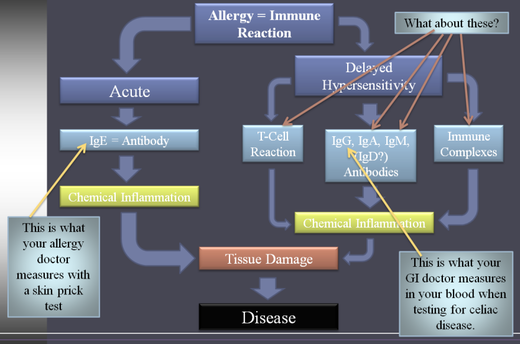Here's mine:
4
Egg white
Chicken egg
Brazil nut
3
Egg yolk
Quail egg
Goose egg
2
Green peas
1
Aspergillus niger
Thyme
Green cabbage
Fractal
Gluten
I was very surprised too to see that I was so intolerant to egg, along with almost everyone else! I've been eating it all my life and I never thought it did anything - perhaps precisely because of that, duh! Some days I skipped it out of boredom and again no change that I could tell of. So now I'm going to leave it altogether and we'll see if I can tell the difference. To be honest, I like eggs but I don't love them, so I can live without them. Too bad for fat bombs though.
My report also included all the gluten grains along the gluten on level '1', although I think that's because the lab was assuming the same level of reactivity due to the gluten, when in fact wheat is way on the bottom of my list when you look at the actual numbers. Never mind, I was never a fan of bread so I wouldn't even consider it, along with oats, rye, barley, etc. Boring!
Some things seem quite random, like green cabbage, peas or thyme. But again I don't mind them that much.
The other big surprise is that stuff that I was almost sure would be on the list was not: coffee and tannin (wine) were not, and I can feel the effect of those. I seem to be fine with dairy, also a surprise, cause I love cheese and I took that to be a sign that it was not good for me. Well, still not planning to include any of those in my regular diet, but maybe in Xmas or something I'll take a sip or a bite in the knowledge that I won't be committing suicide. ;)
Oh, and of all the fruits, I'm certainly not a fan of pineapple - yet that was the very last item on my list, i.e. the most acceptable for my body! I'll have to review it on my list of preferences, I suppose.
4
Egg white
Chicken egg
Brazil nut
3
Egg yolk
Quail egg
Goose egg
2
Green peas
1
Aspergillus niger
Thyme
Green cabbage
Fractal
Gluten
I was very surprised too to see that I was so intolerant to egg, along with almost everyone else! I've been eating it all my life and I never thought it did anything - perhaps precisely because of that, duh! Some days I skipped it out of boredom and again no change that I could tell of. So now I'm going to leave it altogether and we'll see if I can tell the difference. To be honest, I like eggs but I don't love them, so I can live without them. Too bad for fat bombs though.
My report also included all the gluten grains along the gluten on level '1', although I think that's because the lab was assuming the same level of reactivity due to the gluten, when in fact wheat is way on the bottom of my list when you look at the actual numbers. Never mind, I was never a fan of bread so I wouldn't even consider it, along with oats, rye, barley, etc. Boring!
Some things seem quite random, like green cabbage, peas or thyme. But again I don't mind them that much.
The other big surprise is that stuff that I was almost sure would be on the list was not: coffee and tannin (wine) were not, and I can feel the effect of those. I seem to be fine with dairy, also a surprise, cause I love cheese and I took that to be a sign that it was not good for me. Well, still not planning to include any of those in my regular diet, but maybe in Xmas or something I'll take a sip or a bite in the knowledge that I won't be committing suicide. ;)

Oh, and of all the fruits, I'm certainly not a fan of pineapple - yet that was the very last item on my list, i.e. the most acceptable for my body! I'll have to review it on my list of preferences, I suppose.

 Why is there SO many? jeez.
Why is there SO many? jeez. 

